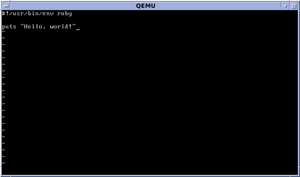Software:nvi
 | |
| Repository | repo |
|---|---|
| Website | sites |
nvi (new vi) is a re-implementation of the classic Berkeley text editor, ex/vi, traditionally distributed with BSD and, later, Unix systems. It was originally distributed as part of the Fourth Berkeley Software Distribution (4BSD).
Due to licensing disputes between AT&T and the Computer Systems Research Group (CSRG) at the University of California, Berkeley, the CSRG was required to replace all Unix-derived portions of BSD source with new and unencumbered code. nvi was one of many components rewritten, despite the fact that the original vi was from UC Berkeley. AT&T had a legal claim over the license.
Credits and distribution
nvi was written by Keith Bostic. It is the default vi on all major BSD systems (NetBSD, OpenBSD, and FreeBSD) as well as MINIX.[1]
It was originally derived from the first incarnation of elvis, written by Steve Kirkendall, as noted in the README file included in nvi's sources.
Sven Verdoolaege added support for Unicode in 2000.[2] He also has been developing a GTK+ front end for nvi, but this effort seems to have stalled. The aspects of nvi that are still marked preliminary or unimplemented are, for the time being, likely to remain that way.
BSD projects continue to use nvi version 1.79 due to licensing differences between Berkeley Database 1.85 and the later versions by Sleepycat Software. nvi is unusual because it uses a database to store the text as it is being edited. Sven Verdoolaege's changes after version 1.79 use locking features not available in the Berkeley DB 1.85 database. Reportedly, changes to nvi after 1.79 make it less vi-compatible.[citation needed]
nvi can vary subtly across the BSDs.
nvi is only available on POSIX/Unix platforms due to its reliance on the curses/ncurses library.[3]
An unmaintained, multilingual version by the late Jun-ichiro itojun Hagino is available as nvi-m17n. [4][5]
A currently-maintained, multibyte version is available as nvi2, and is the default vi on DragonFly BSD.[6]
See also
References
- ↑ Lionel Sambuc. "Termcap update, replacing elvis by nvi.". http://git.minix3.org/?p=minix.git;a=commit;h=3e1db26a5a6252fcff0898d4cb0c3fa16ccf561d.
- ↑ "nvi commitlog". Archived from the original on May 1, 2001. https://web.archive.org/web/20010501133542/http://www.kotnet.org/~skimo/nvi/commitlog.
- ↑ Thomas E. Dickey, NCURSES – Frequently Asked Questions (FAQ), http://invisible-island.net/ncurses/ncurses.faq.html#uses_of_library, retrieved July 11, 2014
- ↑ Jun-ichiro itojun Hagino and Yoshitaka Tokugawa. "Multilingual vi clones: past, now and the future". http://www.usenix.org/events/usenix99/full_papers/hagino/hagino.ps.
- ↑ Federico Biancuzzi (December 4, 2007). "The Man in the Machine". SecurityFocus. http://www.securityfocus.com/columnists/459.
- ↑ Zhihao Yuan (17 November 2022). "nvi2 git repo". https://github.com/lichray/nvi2.
External links
 |
